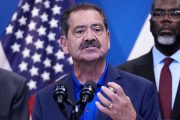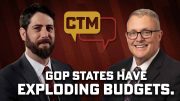Texas Congressman Ron Paul’s bill to audit the Federal Reserve Bank easily passed the House of Representatives July 25 by a vote of 327-98. Every House Republican voted for the “Federal Reserve Transparency Act of 2011” (H.R. 459) except freshman Rep. Bob Turner of New York, while Democrats were about evenly split.
Rep. Paul noted that a full audit of the Federal Reserve by the General Accountability Office (GAO) was particularly necessary after the GAO revealed in 2011, after a partial audit, that the Fed had secretly lent out some $16 trillion in loans to establishment banks at the height of the housing and financial crisis, potentially putting taxpayers at risk for more loans than the nation’s gross domestic product. The partial audit had been commissioned in part by legislation on the Fed that Paul had sponsored in 2009-10.
Paul told his fellow representatives that an audit was needed now more than ever with the emerging international Libor banking scandal. “We should know about the deals that they made when they were fixing the price of LIBOR. These are the kinds of things that have gone on for years that we have no access to.”
Prior to the partial audit in 2011, Federal Reserve officials had refused to give congressional investigators information on its secret loan program, with Fed Chairman Ben Bernanke refusing to tell then-Representative Alan Grayson in 2009 to which foreign banks the Fed had loaned an astonishing $500 billion.
Rep. Paul has been a dogged critic of the Federal Reserve Bank for decades, and the vote prompted Chris Moody of ABC News to quip, “At long last, Ron Paul has his day.” Paul complained the Fed was creating a housing bubble as early as 2001 and reiterated his very specific and accurate charges over the years. The housing bubble crashed in 2007-08, and the nation is still suffering high unemployment as an after-effect of the crash.
Critics of Paul’s bill suggest that the bill is unwise because it would lead to Congress politicizing decisions of the Federal Reserve, though the U.S. Constitution clearly states that “Congress shall have power to … coin Money, regulate the Value thereof” and to make “uniform Laws on the subject of Bankruptcies throughout the United States.” Paul countered charges that a congressional audit would politicize the actions of the Fed by noting that the central bank is already political without any accountability to the voters. “It’s very political when you have a Federal Reserve that can bail out one company and not another company,” Paul said. “That’s pretty political.”
The future of Paul’s bill in the U.S. Senate is unclear, though it has ideologically varied supporters in that body, from Paul’s son, libertarian-leaning Rand Paul of Kentucky, to independent Vermont socialist Bernie Sanders.




